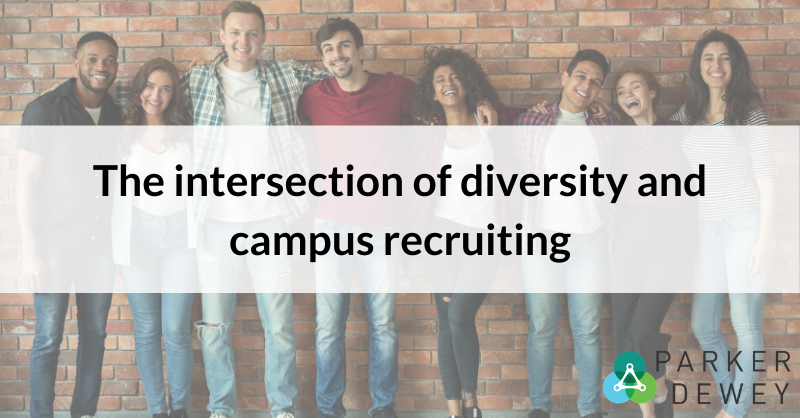
Let's Talk Apprenticeships
With the combination of higher unemployment rates and student debt, the apprenticeship model has become a popular talking point. Viewed through the lens of attacks on colleges and universities, apprenticeships theoretically support companies in growing a pipeline of early career, diverse talent. Congress even introduced a National Apprenticeship Act in January, committing $3 billion over the next five years to expanding registered programs across a range of industries—including tech.
While apprenticeships can be part of a company’s portfolio of talent acquisition strategies, they are neither a replacement for hiring recent college grads and interns, or a silver bullet to drive equitable pathways to professional roles.
The first featured article below argues for the value of apprenticeships in tech—that “by training apprentices from the start of their career, companies inspire loyalty and eliminate the tricky transition phase recent grads and external hires usually need.”
However, this argument is flawed in two ways. First, no one is suggesting that companies should not onboard or train recent college grads—top companies already invest in this type of professional development. In fact, the positive benefits to companies are greatest with college students and recent grads, as “learning how to learn” is one of the core skills honed through traditional liberal arts classes.
Second, do apprenticeships drive “loyalty,” or are they really limiting opportunity? Given many of these apprenticeship programs are focused on tactical skills for a specific company, apprentices may be limited in their career options. Even within the companies that offer apprenticeships, the long-term career pathways may be limited, especially as the apprentices may not have as much opportunity to develop those core skills (like communication, adaptability, and problem solving) as their peers who attended college.
To be clear, I’m not anti-apprenticeship. They present an experience superior to most opportunities available for those without college degrees. But apprenticeships often prove to be, at best, “subsidized training programs,” and at worst, “an alternative path that actually limits opportunities for career development.”
Instead of pushing for college degrees to be replaced by apprenticeships, what if more employers and educators worked together to expand the number of options available to hands-on experience? Read more in this post, where my colleague Michele outlines how changing demographics of early career professionals calls for more flexibility to drive systemic changes to the workplace.
Jeffrey Moss, Founder and CEO
Articles of the Week
Since colleges are failing to prepare students for tech jobs, it’s time to bring back apprenticeships - TechCrunch
Your Next Great Hire Is Graduating From a Community College - EdSurge
To Build a Diverse Company for the Long Term, Develop Junior Talent - Harvard Business Review
Connecting learners, educators and employers unclogs the workforce development pipeline - The Hechinger Report
Since colleges are failing to prepare students for tech jobs, it’s time to bring back apprenticeships - TechCrunch
“There must be a better way. A way that empowers young people to achieve in-demand skills while avoiding the decades-long burden of student loans. A way that doesn’t discriminate based on socioeconomic background while exposing talent-hungry employers to a new pool of qualified, driven individuals.”
Apprenticeships are making a comeback, and this article makes an argument for employing the model across the tech industry. But are they the answer? (Be sure to check out our white paper on the limitations of apprenticeships for our take on this question!)
Related reading: Understanding the Limitations of Apprenticeships on Recruitment Initiatives
Your Next Great Hire Is Graduating From a Community College - EdSurge
“The case for hiring from community colleges is stronger than ever. The COVID-19 pandemic has forced individuals and organizations to rethink how they operate and find new talent pathways. There is a growing consensus that after this crisis, the world should not return to the previous status quo.”
April is Community College Month! Did you know that one-third of U.S. undergraduates attend two-year institutions? Still, recruiters often overlook the community college talent pool and instead seek Bachelor’s earners—even though academic pedigree is not a reliable predictor of a future employee’s skills or aptitudes. This article lays out three steps companies can take to meet their recruiting goals and improve workforce diversity by seeking out talent from these schools.
Related reading: The Intersection of Diversity and Campus RecruitingTo Build a Diverse Company for the Long Term, Develop Junior Talent - Harvard Business Review
“Why aren’t these [diversity] efforts gaining traction? For employers to make meaningful progress, they need to focus less on hiring and more on creating the internal escalators necessary to raise diverse talent up from within.”
Even as organizations continue to step up their DEI efforts, this article raises a key point: diversity is not spread evenly throughout a company, with women and people of color often filling more entry-level roles. One method of actually improving diversity: re-skilling employees so they can move into predominantly white or male positions. This piece lays out the five things businesses need to do in order to make this happen.
Related reading: Improve diversity by providing equitable access
Connecting learners, educators and employers unclogs the workforce development pipeline - The Hechinger Report
“We need bridge builders — intermediaries that play a vital role in workforce development by connecting learners, educators and employers, helping them to speak a common language and resolve local supply and demand mismatches.”
What will it take to overcome the pandemic-instigated economic crisis? To empower “aspiring workers” to upskill and connect to available jobs? Think standardized language around skills and intermediaries to build connections between young people, universities, and schools. This article explores the nitty-gritty of economic recovery, and why “bridge builders” have a crucial role to play.
Related reading: The Future of Campus Recruiting
For more stories and insights on HR, recruiting, and diversity, click here to subscribe to our weekly newsletter Hire Learnings.




